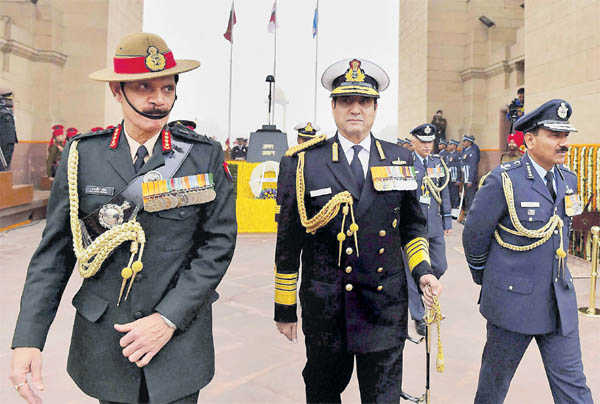
(From left) General Dalbir Singh, Chief of the Army Staff, Navy Chief R K Dhowan and Air Chief Marshal Arup Raha— after paying homage at Amar Jawan Jyoti at India Gate, New Delhi, on Army Day. Will they be content with staff functions alone? PTI
Maj-Gen Harwant Singh (retd)
The Narendra Modi government may have finally decided to create the post of a Chief of Defence Staff (CDS). A four-star officer, with a two-year fixed tenure would be the sole military adviser to the government. However, a single point of advice to the government is only one aspect in the conduct of the national defence paradigm. This proposal misses out on the more relevant aspect of the CDS system.
Recently, the Defence Minister Manohar Parrikar made a telling observation, when he said, “There is no integration mechanism that exists between the three services and there is a lot of infighting amongst them. I will recommend a mechanism for the creation of the post of CDS. Force integration and overlap will also save money.” Of course, he would not know that force integration can come about only and only when CDS in its full spectrum is brought in, where service chiefs have only staff functions and theatre commands function directly under the CDS.
One may overlook naivety on issues of national security, but ignorance of the imperatives of integrating various components and unity of command during operations, in a given theatre, with overall control of operations with the CDS is missed by many from the defence fraternity as well. Coordinating, synergising and meshing together the logistic and combat potential of the two or three wings of the defence forces in a given theatre, as applicable, is an important aspect. The goal is to serve common operational demands and purpose through joint planning and unity of command.
All along there has been much opposition against the adoption of the CDS system in its full form. The political executive continues to be frightened by the bureaucracy of a mirage of a military takeover of the country: once the CDS system is brought in. The service chiefs' unwillingness to be consigned to only staff functions and their propensity for turf battles and bureaucracy's penchant for pitching one service against the other to foster discord militates against the adoption of the CDS in its full play.
At one point, the then Prime Minister Indira Gandhi, wanted to make Field Marshal Sam Manekshaw the CDS, but opposition came from the then air chief and the defence secretary. Unfortunately, the opposition to this proposal with egging on by the bureaucracy, has mainly come from the IAF because the core and kernel of the CDS system in its full spectrum has been escaping it. The CDS system will also be able to evolve a mechanism to acquire compatible equipment, complimentary weapon systems for integrated deployment of combat elements, suitable for a particular theatre of operation. It will also reduce the need for over a dozen and a half present set of commands ( C-in-Cs ) to six to eight theatre commands.
In the Indian context the possibility of a two-front war looms large. The complexities of a two-front war which haunted the German General Staff for well over half a century across two World Wars, are not easy to comprehend and resolve. These would certainly be outside the existing systems of Indian defence establishment to cope with. It involves the need to evolve a joint strategy, judicious distribution of resources between the two fronts in line with the overall strategic plans and unity of command in each theatre.
As we continue to ignore the imperatives of unity of command, an important principle of war, we may end up paying a heavy price for our failure to fully integrate our defence forces.
An examination and analysis of the causes of India's 18 major defeats from Alexander’s invasion to the Battle of Plassey, reveals a ponderous and pedestrian system of higher defence management, that runs like a warp thread in the management and conduct of battles by India.
This was articulated by Sir Jadunath Sarcar, the eminent historian who chronicled military tactics and sieges. On the unity of command, one may quote General Albertvon Wellestein, in Great Captains Unveiled by B.H. Liddle Hart. on the conduct of battle, “Never will I accept a divided command — no not even were God Himself to be my colleague in office. I must command alone or not at all.” This unity of command is, therefore, the very essence of the principle of war.
The writer is a Defence Analyst



























